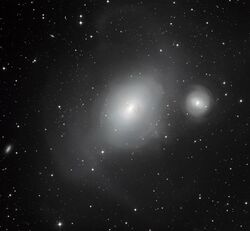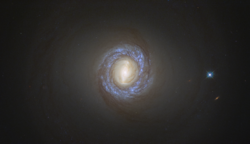Astronomy:NGC 1317
| NGC 1317 | |
|---|---|
 The contrasting galaxies NGC 1316 and 1317 | |
| Observation data (J2000 epoch) | |
| Constellation | Fornax |
| Right ascension | 03h 38.5m[1] |
| Declination | −35° 27′[1] |
| Distance | from 17 megaparsecs (55 Mly) to 26.9 megaparsecs (88 Mly) |
| Apparent magnitude (V) | 11.0[1] |
| Characteristics | |
| Type | SBa[1] |
| Apparent size (V) | 2.8′ × 2.4′[1] (55,000 light-years in diameter) |
| Notable features | Large uncertain of distance |
| Other designations | |
| ESO 357-23, IRAS 03208-3716, MCG -6-8-6, NGC 1318 and PGC 12653 | |
NGC 1317 (also known as NGC 1318) is a barred spiral galaxy in the constellation Fornax, in the Fornax cluster. It was discovered by Julius Schmidt on January 19, 1865. It appears to be interacting with the much larger NGC 1316, but uncertainty in distance estimates and scales of tidal distortions make this uncertain. It is a member of the NGC 1316 subgroup, part of the Fornax Cluster. Its size is 2.8' x 2.4' which, at the average distance, gives a diameter of 55,000 light-years.
Distance estimates

NGC 1317 has an uncertain distance. Based on redshift, the distance is 55.1 million light-years, but some other methods estimate a distance as large as 88.4 million light-years. The distance of this galaxy is therefore somewhere between 55 and 88 Mly, but its true distance is unknown.[2] The average distance between the two estimates is around 70 million light-years, which means NGC 1317 is also in the Fornax Cluster.
References
- ↑ 1.0 1.1 1.2 1.3 1.4 Dunlop, Storm (2005). Atlas of the Night Sky. Collins. ISBN 978-0-00-717223-8.
- ↑ "NED Search Results Regarding NGC 1317". https://ned.ipac.caltech.edu/cgi-bin/objsearch?objname=NGC+1317&extend=no&hconst=73&omegam=0.27&omegav=0.73&corr_z=1&out_csys=Equatorial&out_equinox=J2000.0&obj_sort=RA+or+Longitude&of=pre_text&zv_breaker=30000.0&list_limit=5&img_stamp=YES.
External links
 |
